Principles of Project Management: Personal Reflection and Analysis
VerifiedAdded on 2022/09/18
|10
|2154
|25
Report
AI Summary
This report is a comprehensive personal reflection on the principles of project management, focusing on PMBOK knowledge areas and process groups, and their impact on project management best practices, including the PMI Code of Ethics. It critically compares and contrasts various project management approaches, evaluating their suitability for different project types and risk situations. The report also explores the application of project management tools and techniques, with a particular emphasis on risk management. Furthermore, it critically examines the leadership styles necessary for success in diverse project management scenarios and assesses the author's personal capacity to thrive in those situations. The reflection provides a thorough analysis of the concepts covered, drawing on relevant literature and personal insights to offer a well-rounded perspective on the subject.
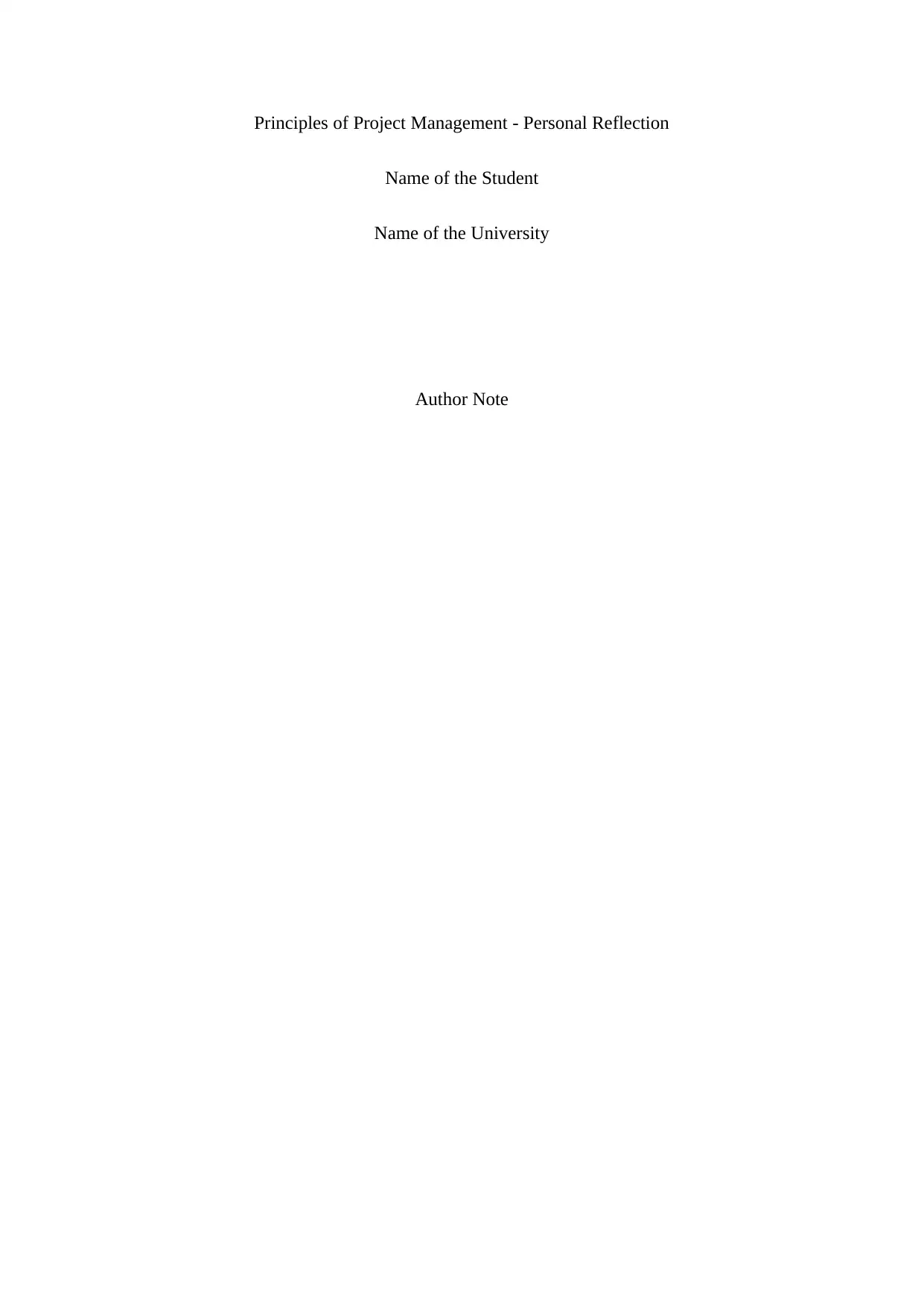
Principles of Project Management - Personal Reflection
Name of the Student
Name of the University
Author Note
Name of the Student
Name of the University
Author Note
Paraphrase This Document
Need a fresh take? Get an instant paraphrase of this document with our AI Paraphraser
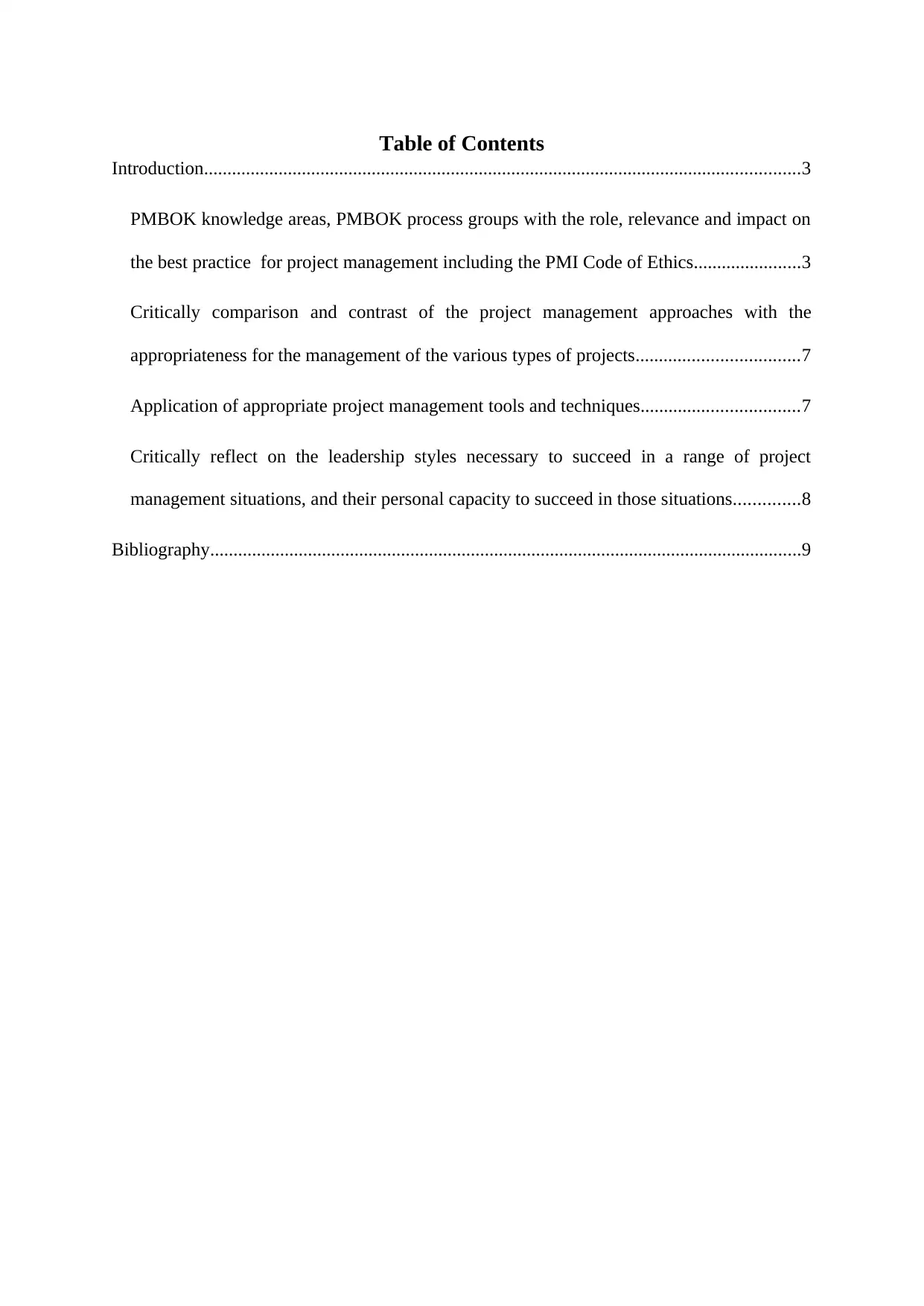
Table of Contents
Introduction................................................................................................................................3
PMBOK knowledge areas, PMBOK process groups with the role, relevance and impact on
the best practice for project management including the PMI Code of Ethics.......................3
Critically comparison and contrast of the project management approaches with the
appropriateness for the management of the various types of projects...................................7
Application of appropriate project management tools and techniques..................................7
Critically reflect on the leadership styles necessary to succeed in a range of project
management situations, and their personal capacity to succeed in those situations..............8
Bibliography...............................................................................................................................9
Introduction................................................................................................................................3
PMBOK knowledge areas, PMBOK process groups with the role, relevance and impact on
the best practice for project management including the PMI Code of Ethics.......................3
Critically comparison and contrast of the project management approaches with the
appropriateness for the management of the various types of projects...................................7
Application of appropriate project management tools and techniques..................................7
Critically reflect on the leadership styles necessary to succeed in a range of project
management situations, and their personal capacity to succeed in those situations..............8
Bibliography...............................................................................................................................9
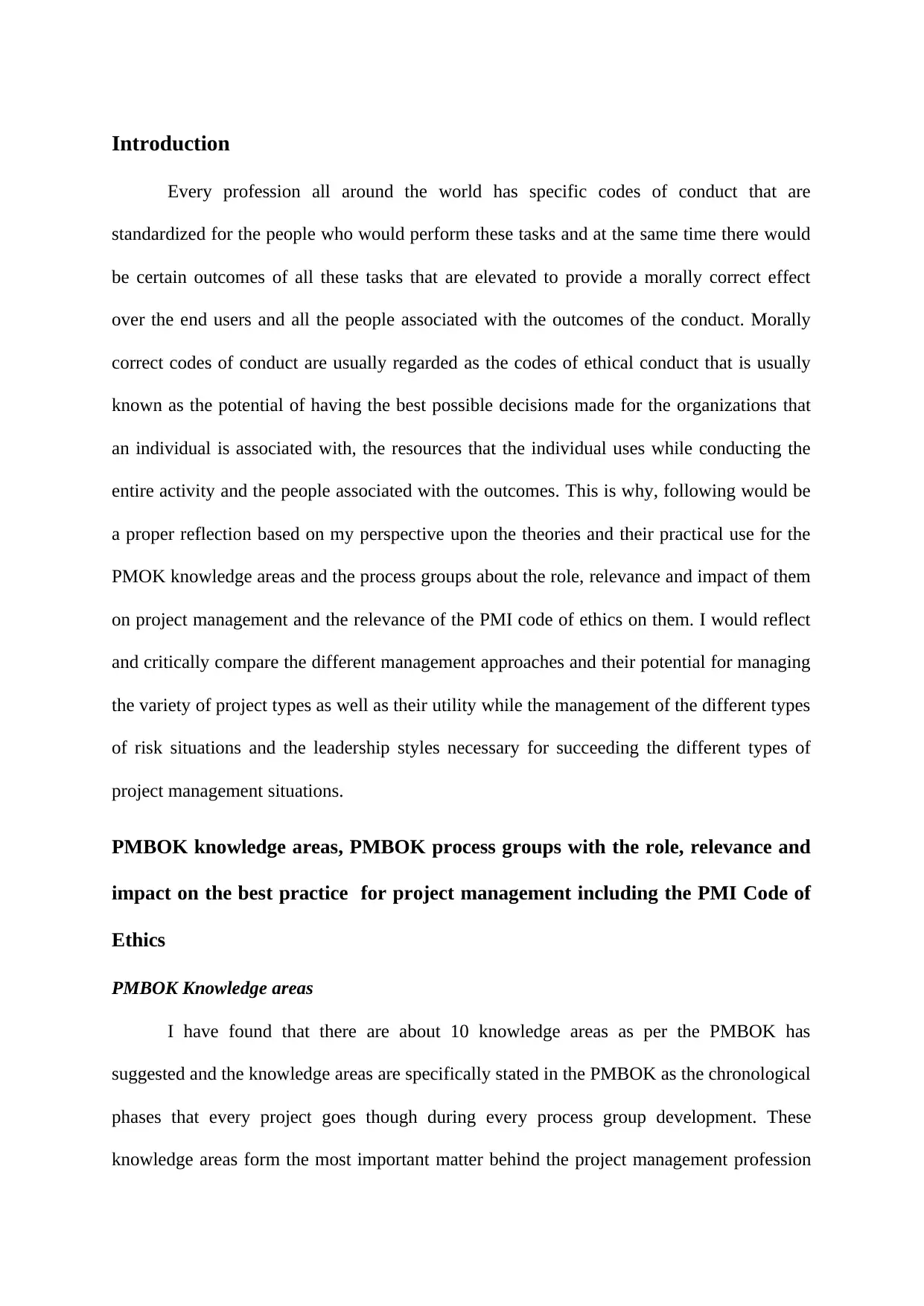
Introduction
Every profession all around the world has specific codes of conduct that are
standardized for the people who would perform these tasks and at the same time there would
be certain outcomes of all these tasks that are elevated to provide a morally correct effect
over the end users and all the people associated with the outcomes of the conduct. Morally
correct codes of conduct are usually regarded as the codes of ethical conduct that is usually
known as the potential of having the best possible decisions made for the organizations that
an individual is associated with, the resources that the individual uses while conducting the
entire activity and the people associated with the outcomes. This is why, following would be
a proper reflection based on my perspective upon the theories and their practical use for the
PMOK knowledge areas and the process groups about the role, relevance and impact of them
on project management and the relevance of the PMI code of ethics on them. I would reflect
and critically compare the different management approaches and their potential for managing
the variety of project types as well as their utility while the management of the different types
of risk situations and the leadership styles necessary for succeeding the different types of
project management situations.
PMBOK knowledge areas, PMBOK process groups with the role, relevance and
impact on the best practice for project management including the PMI Code of
Ethics
PMBOK Knowledge areas
I have found that there are about 10 knowledge areas as per the PMBOK has
suggested and the knowledge areas are specifically stated in the PMBOK as the chronological
phases that every project goes though during every process group development. These
knowledge areas form the most important matter behind the project management profession
Every profession all around the world has specific codes of conduct that are
standardized for the people who would perform these tasks and at the same time there would
be certain outcomes of all these tasks that are elevated to provide a morally correct effect
over the end users and all the people associated with the outcomes of the conduct. Morally
correct codes of conduct are usually regarded as the codes of ethical conduct that is usually
known as the potential of having the best possible decisions made for the organizations that
an individual is associated with, the resources that the individual uses while conducting the
entire activity and the people associated with the outcomes. This is why, following would be
a proper reflection based on my perspective upon the theories and their practical use for the
PMOK knowledge areas and the process groups about the role, relevance and impact of them
on project management and the relevance of the PMI code of ethics on them. I would reflect
and critically compare the different management approaches and their potential for managing
the variety of project types as well as their utility while the management of the different types
of risk situations and the leadership styles necessary for succeeding the different types of
project management situations.
PMBOK knowledge areas, PMBOK process groups with the role, relevance and
impact on the best practice for project management including the PMI Code of
Ethics
PMBOK Knowledge areas
I have found that there are about 10 knowledge areas as per the PMBOK has
suggested and the knowledge areas are specifically stated in the PMBOK as the chronological
phases that every project goes though during every process group development. These
knowledge areas form the most important matter behind the project management profession
⊘ This is a preview!⊘
Do you want full access?
Subscribe today to unlock all pages.

Trusted by 1+ million students worldwide
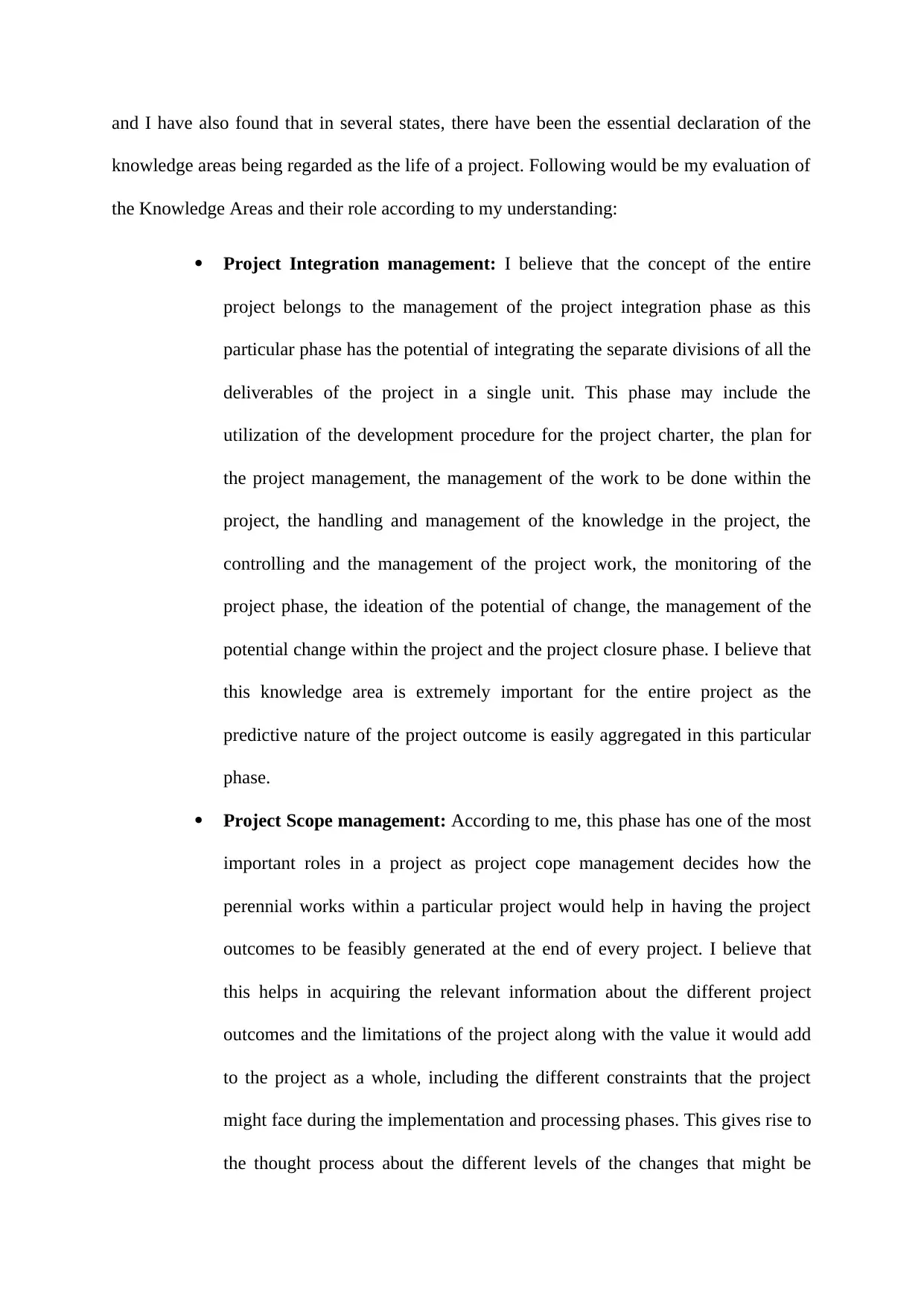
and I have also found that in several states, there have been the essential declaration of the
knowledge areas being regarded as the life of a project. Following would be my evaluation of
the Knowledge Areas and their role according to my understanding:
Project Integration management: I believe that the concept of the entire
project belongs to the management of the project integration phase as this
particular phase has the potential of integrating the separate divisions of all the
deliverables of the project in a single unit. This phase may include the
utilization of the development procedure for the project charter, the plan for
the project management, the management of the work to be done within the
project, the handling and management of the knowledge in the project, the
controlling and the management of the project work, the monitoring of the
project phase, the ideation of the potential of change, the management of the
potential change within the project and the project closure phase. I believe that
this knowledge area is extremely important for the entire project as the
predictive nature of the project outcome is easily aggregated in this particular
phase.
Project Scope management: According to me, this phase has one of the most
important roles in a project as project cope management decides how the
perennial works within a particular project would help in having the project
outcomes to be feasibly generated at the end of every project. I believe that
this helps in acquiring the relevant information about the different project
outcomes and the limitations of the project along with the value it would add
to the project as a whole, including the different constraints that the project
might face during the implementation and processing phases. This gives rise to
the thought process about the different levels of the changes that might be
knowledge areas being regarded as the life of a project. Following would be my evaluation of
the Knowledge Areas and their role according to my understanding:
Project Integration management: I believe that the concept of the entire
project belongs to the management of the project integration phase as this
particular phase has the potential of integrating the separate divisions of all the
deliverables of the project in a single unit. This phase may include the
utilization of the development procedure for the project charter, the plan for
the project management, the management of the work to be done within the
project, the handling and management of the knowledge in the project, the
controlling and the management of the project work, the monitoring of the
project phase, the ideation of the potential of change, the management of the
potential change within the project and the project closure phase. I believe that
this knowledge area is extremely important for the entire project as the
predictive nature of the project outcome is easily aggregated in this particular
phase.
Project Scope management: According to me, this phase has one of the most
important roles in a project as project cope management decides how the
perennial works within a particular project would help in having the project
outcomes to be feasibly generated at the end of every project. I believe that
this helps in acquiring the relevant information about the different project
outcomes and the limitations of the project along with the value it would add
to the project as a whole, including the different constraints that the project
might face during the implementation and processing phases. This gives rise to
the thought process about the different levels of the changes that might be
Paraphrase This Document
Need a fresh take? Get an instant paraphrase of this document with our AI Paraphraser
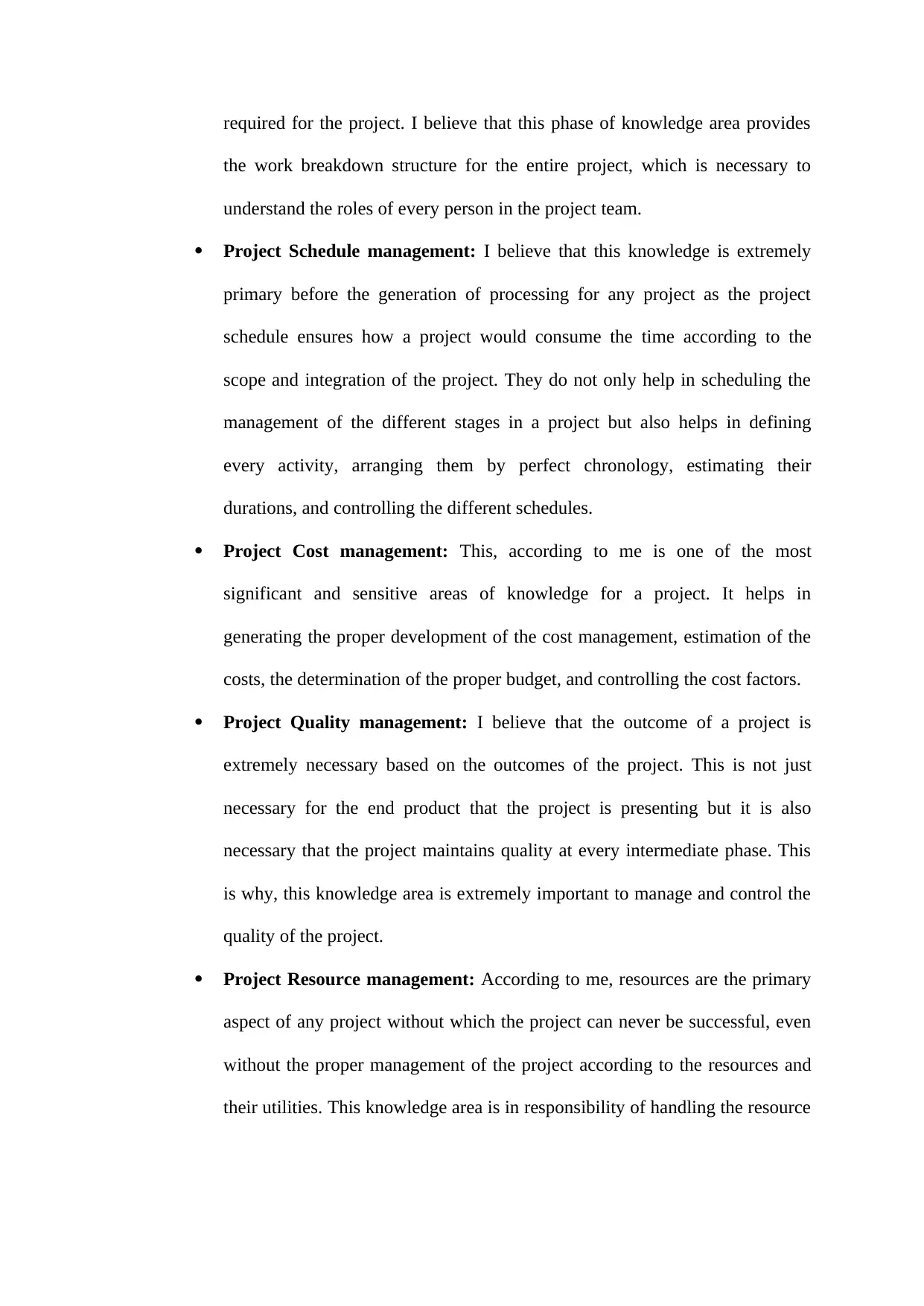
required for the project. I believe that this phase of knowledge area provides
the work breakdown structure for the entire project, which is necessary to
understand the roles of every person in the project team.
Project Schedule management: I believe that this knowledge is extremely
primary before the generation of processing for any project as the project
schedule ensures how a project would consume the time according to the
scope and integration of the project. They do not only help in scheduling the
management of the different stages in a project but also helps in defining
every activity, arranging them by perfect chronology, estimating their
durations, and controlling the different schedules.
Project Cost management: This, according to me is one of the most
significant and sensitive areas of knowledge for a project. It helps in
generating the proper development of the cost management, estimation of the
costs, the determination of the proper budget, and controlling the cost factors.
Project Quality management: I believe that the outcome of a project is
extremely necessary based on the outcomes of the project. This is not just
necessary for the end product that the project is presenting but it is also
necessary that the project maintains quality at every intermediate phase. This
is why, this knowledge area is extremely important to manage and control the
quality of the project.
Project Resource management: According to me, resources are the primary
aspect of any project without which the project can never be successful, even
without the proper management of the project according to the resources and
their utilities. This knowledge area is in responsibility of handling the resource
the work breakdown structure for the entire project, which is necessary to
understand the roles of every person in the project team.
Project Schedule management: I believe that this knowledge is extremely
primary before the generation of processing for any project as the project
schedule ensures how a project would consume the time according to the
scope and integration of the project. They do not only help in scheduling the
management of the different stages in a project but also helps in defining
every activity, arranging them by perfect chronology, estimating their
durations, and controlling the different schedules.
Project Cost management: This, according to me is one of the most
significant and sensitive areas of knowledge for a project. It helps in
generating the proper development of the cost management, estimation of the
costs, the determination of the proper budget, and controlling the cost factors.
Project Quality management: I believe that the outcome of a project is
extremely necessary based on the outcomes of the project. This is not just
necessary for the end product that the project is presenting but it is also
necessary that the project maintains quality at every intermediate phase. This
is why, this knowledge area is extremely important to manage and control the
quality of the project.
Project Resource management: According to me, resources are the primary
aspect of any project without which the project can never be successful, even
without the proper management of the project according to the resources and
their utilities. This knowledge area is in responsibility of handling the resource
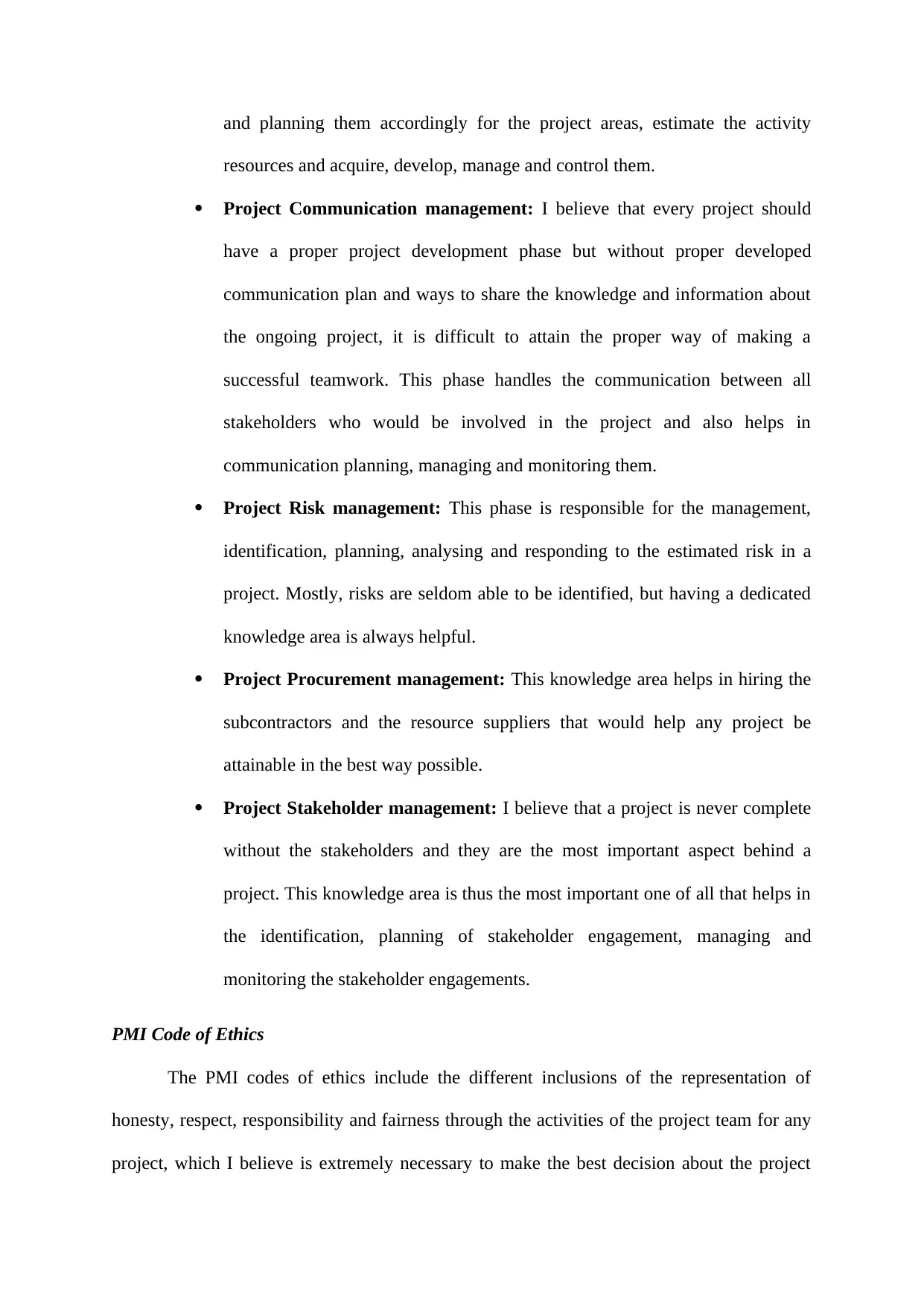
and planning them accordingly for the project areas, estimate the activity
resources and acquire, develop, manage and control them.
Project Communication management: I believe that every project should
have a proper project development phase but without proper developed
communication plan and ways to share the knowledge and information about
the ongoing project, it is difficult to attain the proper way of making a
successful teamwork. This phase handles the communication between all
stakeholders who would be involved in the project and also helps in
communication planning, managing and monitoring them.
Project Risk management: This phase is responsible for the management,
identification, planning, analysing and responding to the estimated risk in a
project. Mostly, risks are seldom able to be identified, but having a dedicated
knowledge area is always helpful.
Project Procurement management: This knowledge area helps in hiring the
subcontractors and the resource suppliers that would help any project be
attainable in the best way possible.
Project Stakeholder management: I believe that a project is never complete
without the stakeholders and they are the most important aspect behind a
project. This knowledge area is thus the most important one of all that helps in
the identification, planning of stakeholder engagement, managing and
monitoring the stakeholder engagements.
PMI Code of Ethics
The PMI codes of ethics include the different inclusions of the representation of
honesty, respect, responsibility and fairness through the activities of the project team for any
project, which I believe is extremely necessary to make the best decision about the project
resources and acquire, develop, manage and control them.
Project Communication management: I believe that every project should
have a proper project development phase but without proper developed
communication plan and ways to share the knowledge and information about
the ongoing project, it is difficult to attain the proper way of making a
successful teamwork. This phase handles the communication between all
stakeholders who would be involved in the project and also helps in
communication planning, managing and monitoring them.
Project Risk management: This phase is responsible for the management,
identification, planning, analysing and responding to the estimated risk in a
project. Mostly, risks are seldom able to be identified, but having a dedicated
knowledge area is always helpful.
Project Procurement management: This knowledge area helps in hiring the
subcontractors and the resource suppliers that would help any project be
attainable in the best way possible.
Project Stakeholder management: I believe that a project is never complete
without the stakeholders and they are the most important aspect behind a
project. This knowledge area is thus the most important one of all that helps in
the identification, planning of stakeholder engagement, managing and
monitoring the stakeholder engagements.
PMI Code of Ethics
The PMI codes of ethics include the different inclusions of the representation of
honesty, respect, responsibility and fairness through the activities of the project team for any
project, which I believe is extremely necessary to make the best decision about the project
⊘ This is a preview!⊘
Do you want full access?
Subscribe today to unlock all pages.

Trusted by 1+ million students worldwide
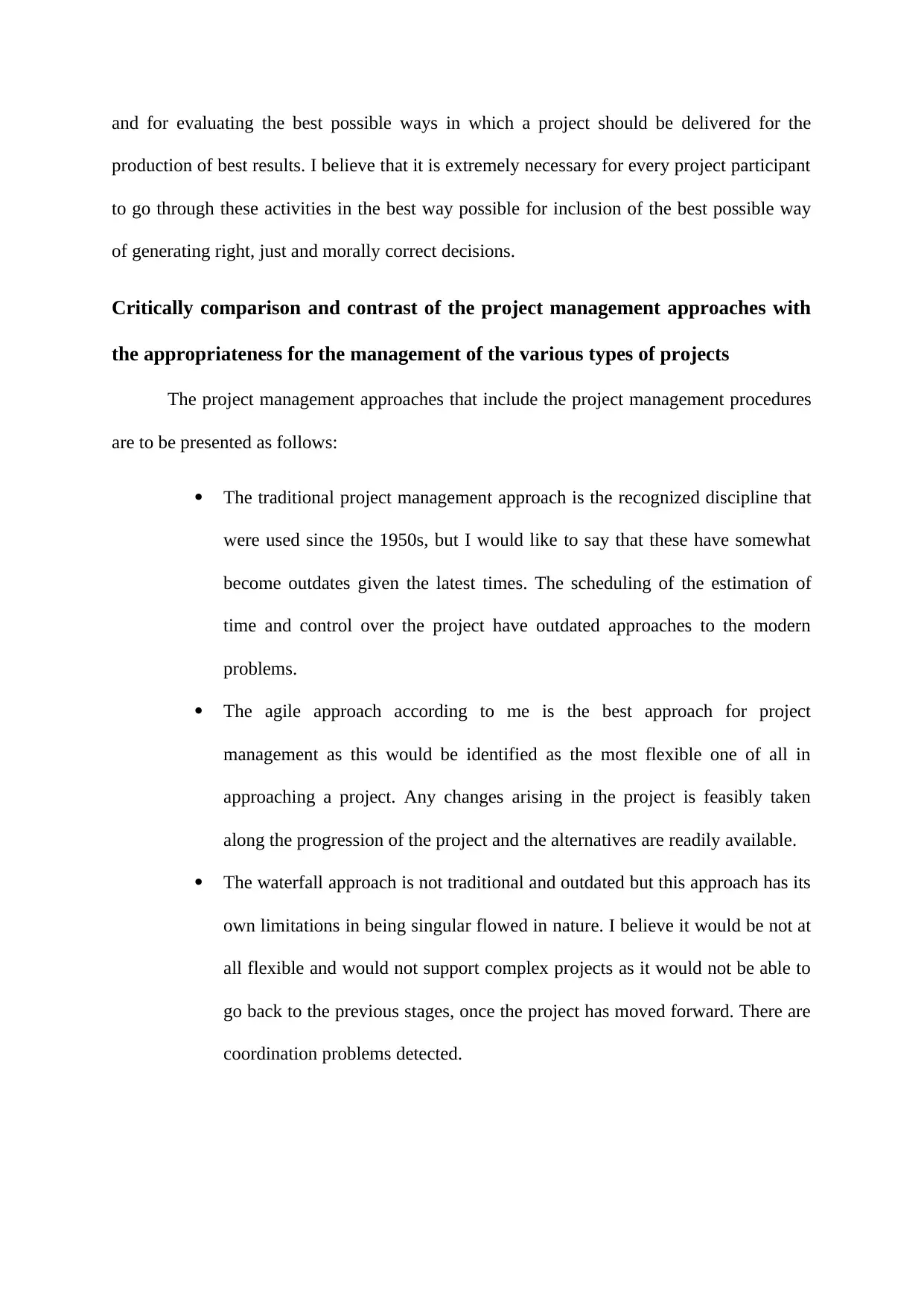
and for evaluating the best possible ways in which a project should be delivered for the
production of best results. I believe that it is extremely necessary for every project participant
to go through these activities in the best way possible for inclusion of the best possible way
of generating right, just and morally correct decisions.
Critically comparison and contrast of the project management approaches with
the appropriateness for the management of the various types of projects
The project management approaches that include the project management procedures
are to be presented as follows:
The traditional project management approach is the recognized discipline that
were used since the 1950s, but I would like to say that these have somewhat
become outdates given the latest times. The scheduling of the estimation of
time and control over the project have outdated approaches to the modern
problems.
The agile approach according to me is the best approach for project
management as this would be identified as the most flexible one of all in
approaching a project. Any changes arising in the project is feasibly taken
along the progression of the project and the alternatives are readily available.
The waterfall approach is not traditional and outdated but this approach has its
own limitations in being singular flowed in nature. I believe it would be not at
all flexible and would not support complex projects as it would not be able to
go back to the previous stages, once the project has moved forward. There are
coordination problems detected.
production of best results. I believe that it is extremely necessary for every project participant
to go through these activities in the best way possible for inclusion of the best possible way
of generating right, just and morally correct decisions.
Critically comparison and contrast of the project management approaches with
the appropriateness for the management of the various types of projects
The project management approaches that include the project management procedures
are to be presented as follows:
The traditional project management approach is the recognized discipline that
were used since the 1950s, but I would like to say that these have somewhat
become outdates given the latest times. The scheduling of the estimation of
time and control over the project have outdated approaches to the modern
problems.
The agile approach according to me is the best approach for project
management as this would be identified as the most flexible one of all in
approaching a project. Any changes arising in the project is feasibly taken
along the progression of the project and the alternatives are readily available.
The waterfall approach is not traditional and outdated but this approach has its
own limitations in being singular flowed in nature. I believe it would be not at
all flexible and would not support complex projects as it would not be able to
go back to the previous stages, once the project has moved forward. There are
coordination problems detected.
Paraphrase This Document
Need a fresh take? Get an instant paraphrase of this document with our AI Paraphraser
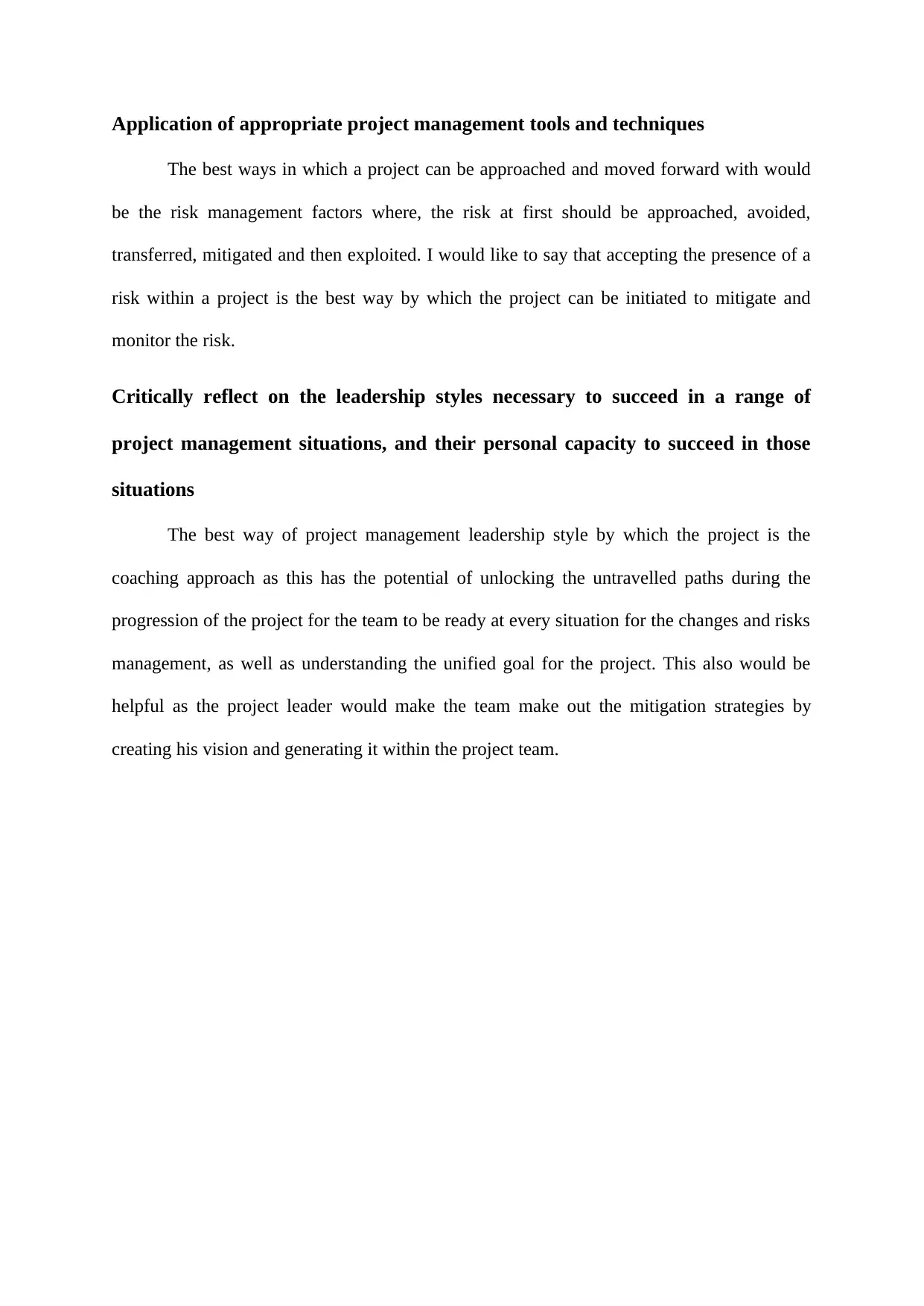
Application of appropriate project management tools and techniques
The best ways in which a project can be approached and moved forward with would
be the risk management factors where, the risk at first should be approached, avoided,
transferred, mitigated and then exploited. I would like to say that accepting the presence of a
risk within a project is the best way by which the project can be initiated to mitigate and
monitor the risk.
Critically reflect on the leadership styles necessary to succeed in a range of
project management situations, and their personal capacity to succeed in those
situations
The best way of project management leadership style by which the project is the
coaching approach as this has the potential of unlocking the untravelled paths during the
progression of the project for the team to be ready at every situation for the changes and risks
management, as well as understanding the unified goal for the project. This also would be
helpful as the project leader would make the team make out the mitigation strategies by
creating his vision and generating it within the project team.
The best ways in which a project can be approached and moved forward with would
be the risk management factors where, the risk at first should be approached, avoided,
transferred, mitigated and then exploited. I would like to say that accepting the presence of a
risk within a project is the best way by which the project can be initiated to mitigate and
monitor the risk.
Critically reflect on the leadership styles necessary to succeed in a range of
project management situations, and their personal capacity to succeed in those
situations
The best way of project management leadership style by which the project is the
coaching approach as this has the potential of unlocking the untravelled paths during the
progression of the project for the team to be ready at every situation for the changes and risks
management, as well as understanding the unified goal for the project. This also would be
helpful as the project leader would make the team make out the mitigation strategies by
creating his vision and generating it within the project team.
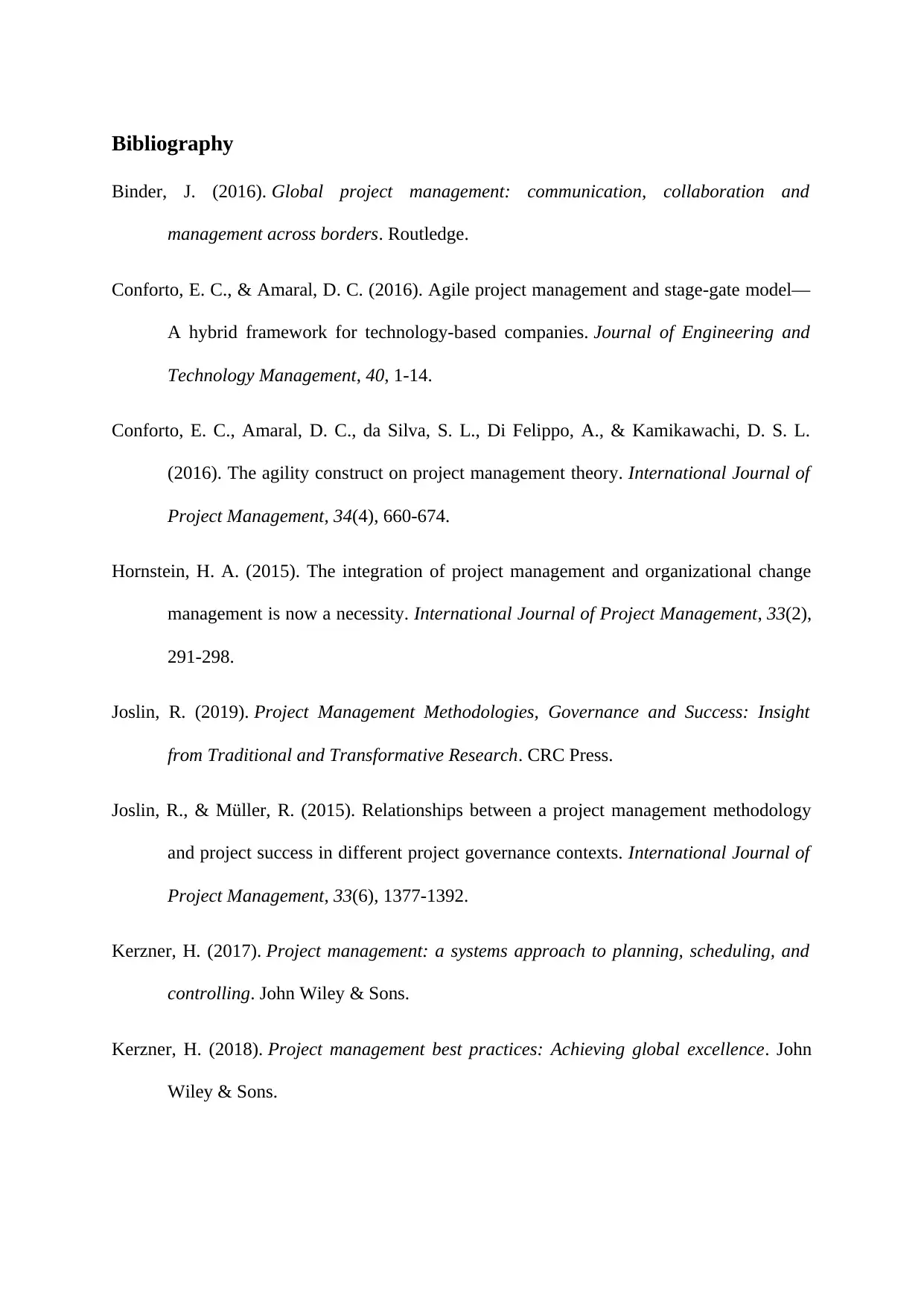
Bibliography
Binder, J. (2016). Global project management: communication, collaboration and
management across borders. Routledge.
Conforto, E. C., & Amaral, D. C. (2016). Agile project management and stage-gate model—
A hybrid framework for technology-based companies. Journal of Engineering and
Technology Management, 40, 1-14.
Conforto, E. C., Amaral, D. C., da Silva, S. L., Di Felippo, A., & Kamikawachi, D. S. L.
(2016). The agility construct on project management theory. International Journal of
Project Management, 34(4), 660-674.
Hornstein, H. A. (2015). The integration of project management and organizational change
management is now a necessity. International Journal of Project Management, 33(2),
291-298.
Joslin, R. (2019). Project Management Methodologies, Governance and Success: Insight
from Traditional and Transformative Research. CRC Press.
Joslin, R., & Müller, R. (2015). Relationships between a project management methodology
and project success in different project governance contexts. International Journal of
Project Management, 33(6), 1377-1392.
Kerzner, H. (2017). Project management: a systems approach to planning, scheduling, and
controlling. John Wiley & Sons.
Kerzner, H. (2018). Project management best practices: Achieving global excellence. John
Wiley & Sons.
Binder, J. (2016). Global project management: communication, collaboration and
management across borders. Routledge.
Conforto, E. C., & Amaral, D. C. (2016). Agile project management and stage-gate model—
A hybrid framework for technology-based companies. Journal of Engineering and
Technology Management, 40, 1-14.
Conforto, E. C., Amaral, D. C., da Silva, S. L., Di Felippo, A., & Kamikawachi, D. S. L.
(2016). The agility construct on project management theory. International Journal of
Project Management, 34(4), 660-674.
Hornstein, H. A. (2015). The integration of project management and organizational change
management is now a necessity. International Journal of Project Management, 33(2),
291-298.
Joslin, R. (2019). Project Management Methodologies, Governance and Success: Insight
from Traditional and Transformative Research. CRC Press.
Joslin, R., & Müller, R. (2015). Relationships between a project management methodology
and project success in different project governance contexts. International Journal of
Project Management, 33(6), 1377-1392.
Kerzner, H. (2017). Project management: a systems approach to planning, scheduling, and
controlling. John Wiley & Sons.
Kerzner, H. (2018). Project management best practices: Achieving global excellence. John
Wiley & Sons.
⊘ This is a preview!⊘
Do you want full access?
Subscribe today to unlock all pages.

Trusted by 1+ million students worldwide
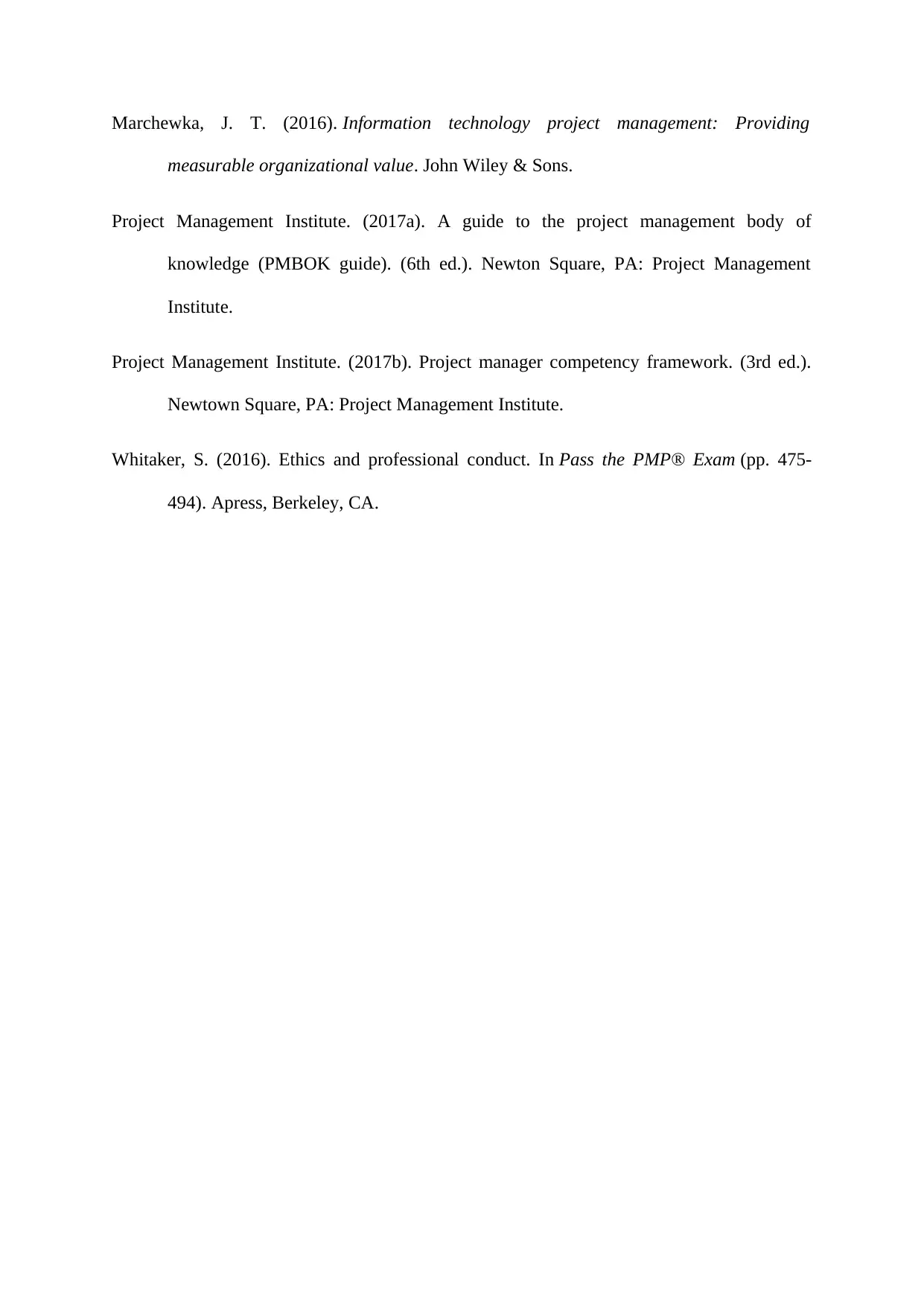
Marchewka, J. T. (2016). Information technology project management: Providing
measurable organizational value. John Wiley & Sons.
Project Management Institute. (2017a). A guide to the project management body of
knowledge (PMBOK guide). (6th ed.). Newton Square, PA: Project Management
Institute.
Project Management Institute. (2017b). Project manager competency framework. (3rd ed.).
Newtown Square, PA: Project Management Institute.
Whitaker, S. (2016). Ethics and professional conduct. In Pass the PMP® Exam (pp. 475-
494). Apress, Berkeley, CA.
measurable organizational value. John Wiley & Sons.
Project Management Institute. (2017a). A guide to the project management body of
knowledge (PMBOK guide). (6th ed.). Newton Square, PA: Project Management
Institute.
Project Management Institute. (2017b). Project manager competency framework. (3rd ed.).
Newtown Square, PA: Project Management Institute.
Whitaker, S. (2016). Ethics and professional conduct. In Pass the PMP® Exam (pp. 475-
494). Apress, Berkeley, CA.
1 out of 10
Related Documents
Your All-in-One AI-Powered Toolkit for Academic Success.
+13062052269
info@desklib.com
Available 24*7 on WhatsApp / Email
![[object Object]](/_next/static/media/star-bottom.7253800d.svg)
Unlock your academic potential
Copyright © 2020–2026 A2Z Services. All Rights Reserved. Developed and managed by ZUCOL.





